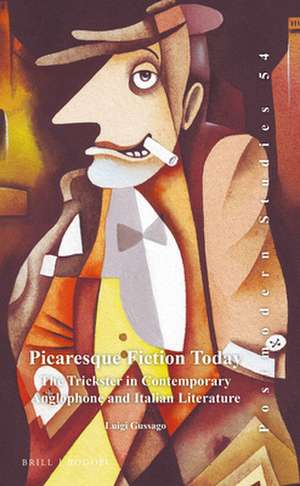Picaresque Fiction Today: The Trickster in Contemporary Anglophone and Italian Literature: Postmodern Studies, cartea 54
Autor Luigi Gussagoen Limba Engleză Hardback – 7 sep 2016
Referring to a corpus of eight contemporary novels, the author retraces a textual legacy linking the traditional picaresque to its recent descendants, with the main purpose of identifying the way picaresque novels offer a privileged insight into our sceptical times.
Cover illustration by Eugene Ivanov "Night Airing", 2007.
Preț: 711.07 lei
Preț vechi: 867.16 lei
-18% Nou
Puncte Express: 1067
Preț estimativ în valută:
136.11€ • 142.71$ • 112.46£
136.11€ • 142.71$ • 112.46£
Carte indisponibilă temporar
Doresc să fiu notificat când acest titlu va fi disponibil:
Se trimite...
Preluare comenzi: 021 569.72.76
Specificații
ISBN-13: 9789004311220
ISBN-10: 900431122X
Pagini: 306
Dimensiuni: 155 x 235 x 23 mm
Greutate: 0.57 kg
Editura: Brill
Colecția Brill
Seria Postmodern Studies
ISBN-10: 900431122X
Pagini: 306
Dimensiuni: 155 x 235 x 23 mm
Greutate: 0.57 kg
Editura: Brill
Colecția Brill
Seria Postmodern Studies
Cuprins
Acknowledgements
Introduction: A Journey around the Picaresque Novel
Chapter 1
History through Roguish Eyes
Foreword
History and picaresque fiction
Meaning and significance in historical fiction
The pícaro and history
Dual sign irony
‘Historical’ irony
Deictic markers of time and space
Polemical use of the allocutive pronoun ‘you’
Metonymy
Markers of ‘being’ and ‘seeming’
Otto, Baudolino, Niketas: three portraits of the Emperor
The death of two obsessions
Chapter 2
Alienation and Counter-Culture
Foreword
The picaresque counter-culture
What happens at the boundary?
The stranger, der Fremde, l’estraneo
Mirror symmetry and alienation
Mythological and metadescriptive consciousness
Homonyms/synonyms
Circumlocution
Euphemism
Synecdoche
Acting vs improvising
Rhetorical questions
Odilo’s private holocaust
Chapter 3
Women on the Edge: Sexuality and Gender Dissent
Foreword
Platonic love and the pícara
Cupid, Psyche and curiosity
The constraints of nature
Procreation
Parenthood
The constraints of society
Demystified women
Religion
Sentimental love
Primeval innocence
Literature, ambition and transcendence in Vendita galline km 2
King Lear’s pasteboard crown
Chapter 4
Humour and the Muffled Voice of Reason
Foreword
Varieties of humour in the picaresque
Irony
Irony in the picaresque: Benni and Doyle
Contradiction
Self-irony
Summary
Satire
Self-satire
Parody
The enlightened grin
The Enlightenment watershed
Individualism, common good and general will
Experience and causation
The question of happiness
God’s laughter in Saltatempo
Concluding Remarks
Bibliography
Introduction: A Journey around the Picaresque Novel
Chapter 1
History through Roguish Eyes
Foreword
History and picaresque fiction
Meaning and significance in historical fiction
The pícaro and history
Dual sign irony
‘Historical’ irony
Deictic markers of time and space
Polemical use of the allocutive pronoun ‘you’
Metonymy
Markers of ‘being’ and ‘seeming’
Otto, Baudolino, Niketas: three portraits of the Emperor
The death of two obsessions
Chapter 2
Alienation and Counter-Culture
Foreword
The picaresque counter-culture
What happens at the boundary?
The stranger, der Fremde, l’estraneo
Mirror symmetry and alienation
Mythological and metadescriptive consciousness
Homonyms/synonyms
Circumlocution
Euphemism
Synecdoche
Acting vs improvising
Rhetorical questions
Odilo’s private holocaust
Chapter 3
Women on the Edge: Sexuality and Gender Dissent
Foreword
Platonic love and the pícara
Cupid, Psyche and curiosity
The constraints of nature
Procreation
Parenthood
The constraints of society
Demystified women
Religion
Sentimental love
Primeval innocence
Literature, ambition and transcendence in Vendita galline km 2
King Lear’s pasteboard crown
Chapter 4
Humour and the Muffled Voice of Reason
Foreword
Varieties of humour in the picaresque
Irony
Irony in the picaresque: Benni and Doyle
Contradiction
Self-irony
Summary
Satire
Self-satire
Parody
The enlightened grin
The Enlightenment watershed
Individualism, common good and general will
Experience and causation
The question of happiness
God’s laughter in Saltatempo
Concluding Remarks
Bibliography
Notă biografică
Luigi Gussago, Ph.D. (2014), La Trobe University, Melbourne, is a researcher and archive curator at the Italian Australian Institute at that university. He has published articles and book chapters on comparative literature and on individual authors including Peter Carey, Martin Amis and Primo Levi.














